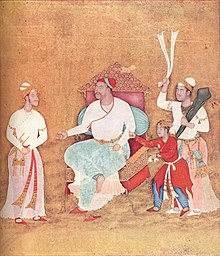 | |
| Total population | |
|---|---|
| 11,747,400 (2011)[1] | |
| Regions with significant populations | |
| India • Saudi Arabia • Pakistan • United Arab Emirates • United States of America • United Kingdom • Canada • Turkey | |
| Languages | |
| Deccani Urdu | |
| Religion | |
| Islam Majority Sunni Islam Minority Shia (incl. Isma'ilism and Twelver Shi'ism) | |
| Related ethnic groups | |
| Tamil Muslims • Andhra Muslims • Marathi Muslims • Hyderabadi Muslims • Muhajir people • Other Indian Muslim communities |
The Deccanis or Deccani people are an Indo-Aryan ethno-religious community of Deccani-speaking Muslims who inhabit or are from the Deccan region of South India.[2] The community traces its origins to the shifting of the Delhi Sultanate's capital from Delhi to Daulatabad in 1327 during the reign of Muhammad bin Tughluq.[3] Further ancestry can also be traced from immigrant Muslims referred to as Afaqis,[4] also known as Pardesis who came from Central Asia, Iraq and Iran and had settled in the Deccan region during the Bahmani Sultanate (1347). The migration of Muslim Hindavi-speaking people to the Deccan and intermarriage with the local Hindus who converted to Islam,[5] led to the creation of a new community of Hindustani-speaking Muslims, known as the Deccani, who would come to play an important role in the politics of the Deccan.[6] Their language, Deccani, emerged as a language of linguistic prestige and culture during the Bahmani Sultanate, further evolving in the Deccan Sultanates.[7]
Following the demise of the Bahmanis, the Deccan Sultanate period marked a golden age for Deccani culture, notably in the arts, language, and architecture.[8] The Deccani people form significant minorities in the Deccan, including the Maharashtran regions of Marathwada and Vidarbha, and the states of Telangana, Andhra Pradesh, Karnataka (except Tulu Nadu) and northern Tamil Nadu. They form a majority in the old cities of Hyderabad and Aurangabad.[9][10] After the Partition of India and the annexation of Hyderabad, large diaspora communities formed outside the Deccan, especially in Pakistan, where they make up a significant portion of the Urdu speaking minority, the Muhajirs.[11]
The Deccani people are further divided into various groups that can broadly be lumped into three: the Hyderabadis (from Hyderabad State); Mysoris (from Mysore state, including Bangalore), and Madrasis (from Madras state, including Kurnool, Nellore, Guntur and Chennai). Deccani is the mother tongue of most Muslims in the states of Karnataka, Telangana and Andhra Pradesh, and it is spoken by a section of Muslims in Maharashtra, Goa, Kerala and Tamil Nadu.
- ^ "Deccani population statistics, 2011".
- ^ "Kya ba so ba – Learning to speak south-indian urdu". www.zanyoutbursts.com. Retrieved 18 March 2016.
- ^ Aggarwal, Dr Malti Malik and Mala. Social Science. New Saraswati House India Pvt Ltd. ISBN 978-93-5199-083-3.
- ^ "Āfāqī | people | Britannica". www.britannica.com. Retrieved 25 October 2023.
- ^ Eaton, Richard Maxwell (8 March 2015). The Sufis of Bijapur, 1300-1700: Social Roles of Sufis in Medieval India. Princeton University Press. ISBN 978-1-4008-6815-5.
- ^ Burton, J. (February 1968). "V. N. Misra and M. S. Mate Indian prehistory: 1964. (Deccan College Building Centenary and Silver Jubilee Series, No.32.) xxiii, 264 pp. Poona: Deccan college postgraduate and Research Institute, 1965. Rs.15". Bulletin of the School of Oriental and African Studies. 31 (1): 162–164. doi:10.1017/s0041977x00113035. ISSN 0041-977X. S2CID 161064253.
- ^ "Bahmani sultanate | historical Muslim state, India". Encyclopædia Britannica. Retrieved 18 March 2016.
- ^ "Sultans of Deccan India, 1500-1700 Opulence and Fantasy | The Metropolitan Museum of Art". metmuseum.org. Retrieved 18 March 2016.
- ^ "Urdu is the 2nd most spoken language in 5 states". The Siasat Daily. 2 September 2019. Retrieved 4 March 2021.
- ^ Eaton, Richard Maxwell (1996). Sufis of Bijapur, 1300 - 1700 : social roles of Sufis in medieval India (2nd ed.). New Delhi: Munshiram Manoharlal Publ. p. 41. ISBN 978-8121507400. Retrieved 11 May 2016.
- ^ Leonard, Karen Isaksen (1 January 2007). Locating Home: India's Hyderabadis Abroad. Stanford University Press. ISBN 9780804754422.